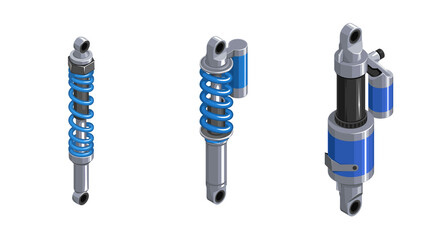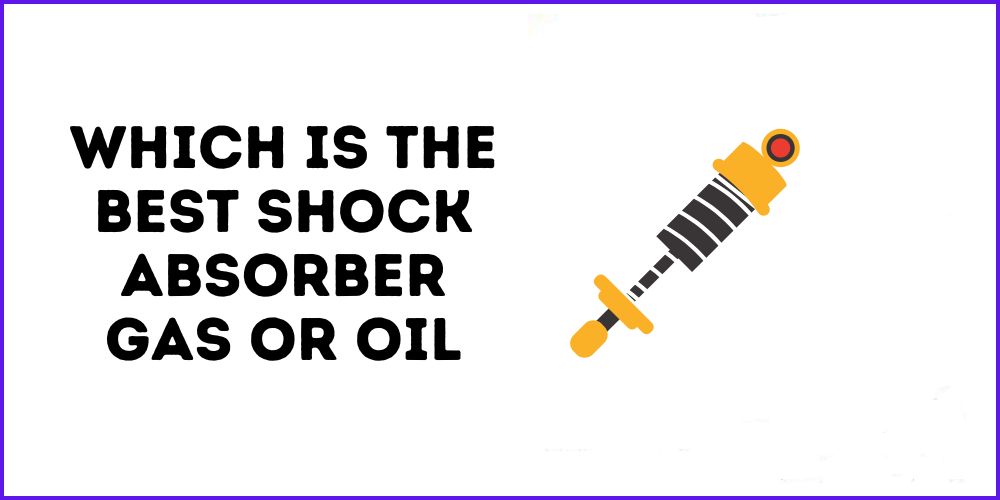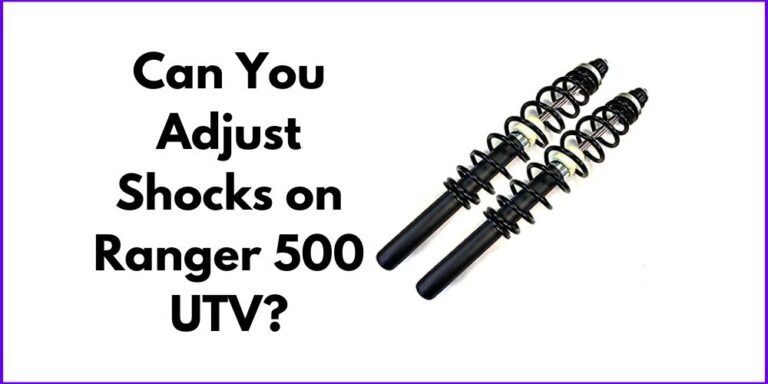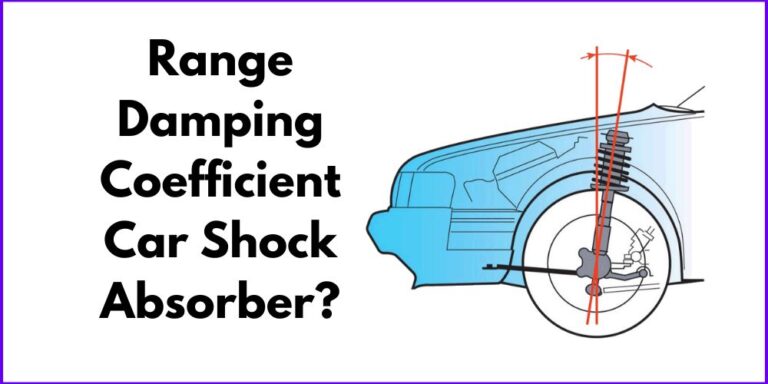Shock absorbers are an important component of a vehicle’s suspension system. They are responsible for damping the movement of the springs and providing a smooth ride. Without shock absorbers, a vehicle’s springs would bounce up and down excessively, leading to a rough and potentially dangerous ride.
There are two main types of shock absorbers: gas and oil. Gas shock absorbers use pressurized gas to dampen the movement of the springs, while oil shock absorbers use oil. In this post, we will compare the two types of shock absorbers and determine which is best for different situations.
Inside the shock absorber is a piston that moves up and down inside a cylinder filled with oil or gas. As the piston moves, it forces the oil or gas through small holes or valves, which creates resistance and slows down the movement of the springs. This resistance helps to smooth out the ride and prevent the vehicle from bouncing excessively.
Overall, the function of shock absorbers is to provide a smooth and comfortable ride by damping the movement of the springs and absorbing any impacts from the road.
Which Is The Best Shock Absorber Gas Or Oil?

Gas shock absorbers
Gas shock absorbers use pressurized gas, typically nitrogen, to dampen the movement of the springs. The gas is contained within a sealed chamber and is used to resist the movement of the piston as it moves up and down inside the shock absorber cylinder.
One of the main benefits of gas shock absorbers is their improved handling and performance. The pressurized gas allows for a faster response time and better control, especially in high-speed or sporty driving situations. Gas shock absorbers can also provide a more refined and comfortable ride due to the smooth and consistent damping action of the gas.
However, there are also some potential drawbacks to consider with gas shock absorbers. One concern is the possibility of gas leakage, which can reduce the performance of the shock absorbers and potentially cause damage to the suspension system. Gas shock absorbers are also generally more expensive than oil shock absorbers, which may be a consideration for some drivers.

Pros:
- Improved handling and performance: The pressurized gas in gas shock absorbers allows for faster response times and better control, particularly in high-speed or sporty driving situations.
- Faster response time: Gas shock absorbers can react more quickly to changes in the road, providing a more responsive and agile ride.
- More refined and comfortable ride: The smooth and consistent damping action of the gas can provide a more comfortable ride.
Cons:
- Potential for gas leakage: Gas shock absorbers are sealed, but there is still a risk of gas leakage, which can reduce the performance of the shock absorbers and potentially cause damage to the suspension system.
- Higher cost: Gas shock absorbers are generally more expensive than oil shock absorbers.
Oil shock absorbers
Oil shock absorbers use oil to dampen the movement of the springs. The oil is contained within the cylinder and is forced through small holes or valves as the piston moves up and down. The resistance created by the oil slows down the movement of the springs and helps to provide a smooth ride.
One of the main benefits of oil shock absorbers is their durability. Oil is less prone to leakage than gas and can withstand a wide range of temperatures and conditions. Oil shock absorbers are also generally more affordable than gas shock absorbers, which may be a consideration for some drivers.
However, there are also some potential drawbacks to consider with oil shock absorbers. One disadvantage is that they tend to have a slower response time compared to gas shock absorbers, which can affect handling and performance. Oil shock absorbers may also provide a less refined and comfortable ride due to the less consistent damping action of the oil.
Pros:
- Durability: Oil shock absorbers are generally more durable than gas shock absorbers, as oil is less prone to leakage and can withstand a wide range of temperatures and conditions.
- Low cost: Oil shock absorbers are generally more affordable than gas shock absorbers.
Cons:
- Slower response time: Oil shock absorbers tend to have a slower response time compared to gas shock absorbers, which can affect handling and performance.
- Less refined and comfortable ride: The damping action of oil shock absorbers may be less consistent than gas shock absorbers, leading to a less refined and comfortable ride.

Comparison of Gas and Oil Shock Absorbers
When comparing gas and oil shock absorbers, there are several factors to consider, including cost, performance, durability, and ride comfort. Here is a comparison of the two types of shock absorbers:
- Cost: Oil shock absorbers are generally more affordable than gas shock absorbers.
- Performance: Gas shock absorbers tend to have a faster response time and can provide improved handling and performance, particularly in high-speed or sporty driving situations. Oil shock absorbers may have a slower response time and may not provide the same level of performance.
- Durability: Oil shock absorbers are generally more durable than gas shock absorbers, as oil is less prone to leakage and can withstand a wide range of temperatures and conditions. Gas shock absorbers may be prone to gas leakage, which can reduce their performance and potentially cause damage to the suspension system.
- Ride comfort: Gas shock absorbers can provide a more refined and comfortable ride due to the smooth and consistent damping action of the gas. Oil shock absorbers may provide a less refined and comfortable ride due to the less consistent damping action of the oil.
Overall, both types of shock absorbers have their own benefits and drawbacks. Gas shock absorbers may be the best choice for drivers who prioritize performance and ride comfort, while oil shock absorbers may be a good option for those who value durability and cost. It’s important for drivers to consider their own needs and preferences when choosing shock absorbers for their vehicles.
Which Shock Absorbers Is the Best – Oil or Gas?
Gas Shock Absorbers | Oil Shock Absorbers |
| Improved handling and performance | Durability |
| Faster response time | Low cost |
| More refined and comfortable ride | Slower response time |
| Potential for gas leakage | Less refined and comfortable ride |
| Higher cost |
When it comes to choosing between gas and oil shock absorbers, it’s important to consider your driving style, the conditions in which you most often drive, and your personal preferences for ride comfort and suspension stiffness.
If you have a sports car or prefer a tougher ride, gas shock absorbers may be the better choice for you. They can provide improved handling, faster response times, and a more refined ride. However, gas shock absorbers are more expensive and may be prone to gas leakage.
On the other hand, if you drive a regular car and have a measured driving style, oil shock absorbers may be a good fit for you. They are durable and cost-effective but may have a slower response time and provide a less refined ride.
However, the choice of shock absorbers is a personal decision that should be based on your individual needs and preferences. It’s important not to rely on the advice of friends or acquaintances, as everyone has a different understanding of comfort and driving.
FAQs
What are the 4 main types of shock absorbers?
There are several types of shock absorbers, but the four main types are hydraulic, pneumatic, hydraulic with a gas charge, and electronic.
Which type of shock absorber is most widely used nowadays?
Hydraulic shock absorbers are the most widely used type nowadays. They use oil to dampen the movement of the springs and are durable, affordable, and widely available.
What is the most shock-resistant material?
The most shock-resistant material is generally considered to be metal. Metal is strong and can withstand significant impact forces, making it well-suited for use in shock absorbers and other components that are subjected to high levels of stress.
What type of car shock is the most common?
The most common type of car shock absorber is the hydraulic shock absorber, which uses oil to dampen the movement of the springs. Hydraulic shock absorbers are widely used in both passenger cars and heavy-duty vehicles due to their durability, affordability, and performance.







